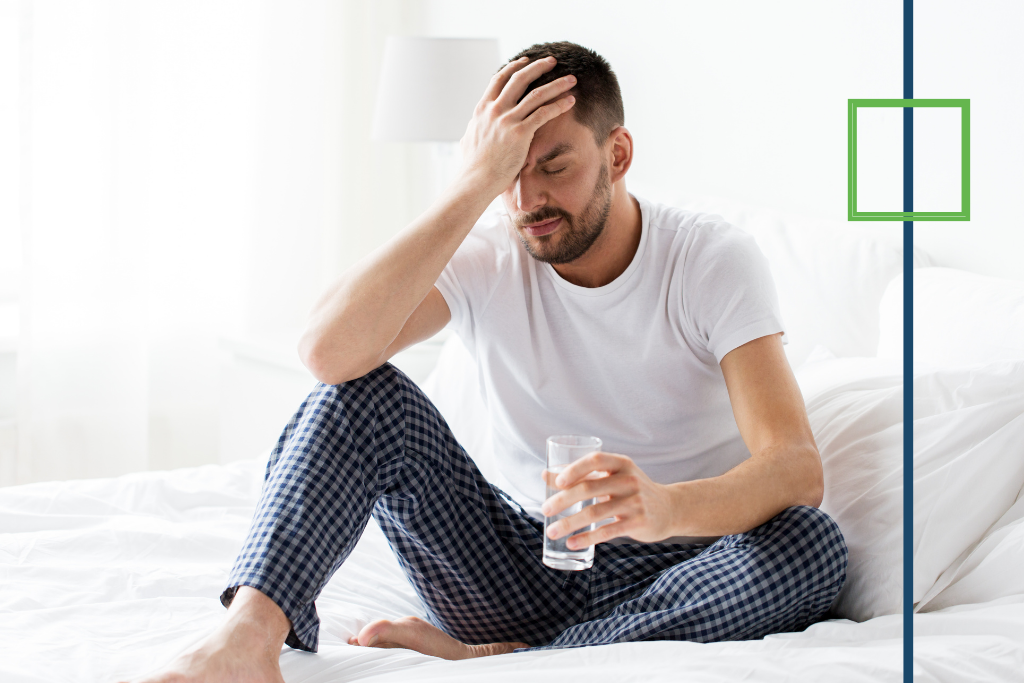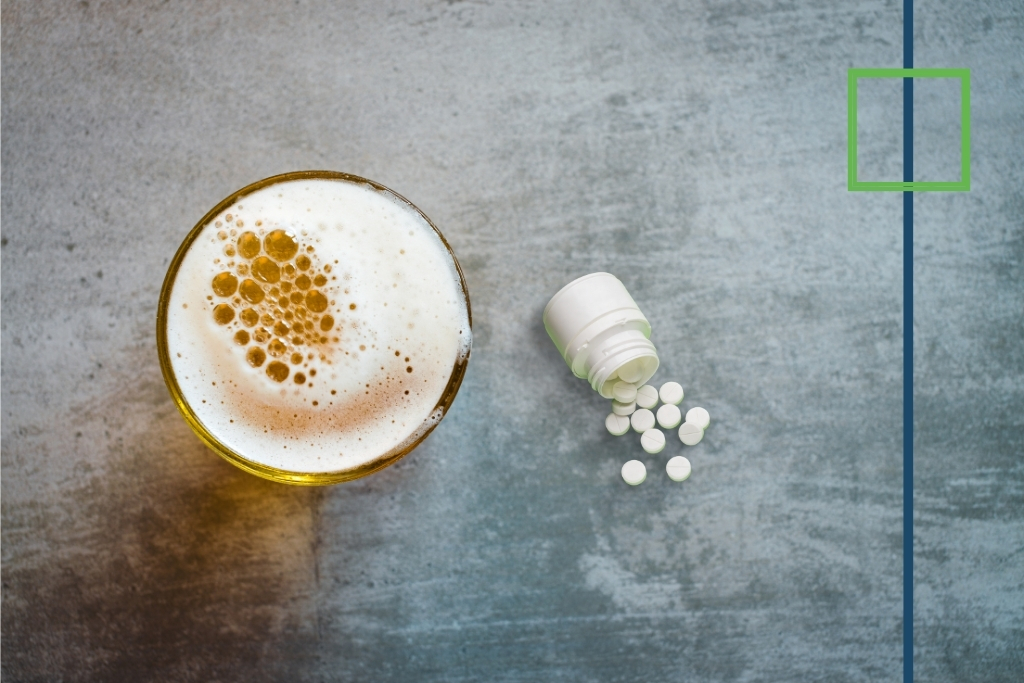What is Naltrexone?
Intramuscular extended-release Naltrexone is a medication approved by the Food and Drug Administration (FDA) for both opioid addiction treatment and alcoholism treatment as a medication-assisted treatment (MAT) option. Vivitrol is the brand name of Naltrexone. Vivitrol shot can be used to help people maintain abstinence while recovering from alcohol or heroin addiction. While naltrexone hydrochloride is for both daily and once-a-month dosages, Vivitrol is injected once a month
Naltrexone can be prescribed and administered by any practitioner licensed to prescribe medications and is available in a pill form for Alcohol Use disorder or as an extended-release intramuscular injectable for either Alcohol or Opioid Use disorder. A Risk Evaluation and Mitigation Strategy (REMS) is required for the long-acting injectable formulation to ensure that the benefits of the drug outweigh its risks. The pill form can be taken daily for alcohol use disorder, but the extended-release injectable formulation is approved for the treatment of opioid or heroin addiction. The pill form is taken daily and the extended-release injectable is administered every four weeks, or once a month, by a practitioner.
Naltrexone is one component of a comprehensive treatment plan, which includes behavioral counseling and cognitive-behavioral therapies to provide individuals with a whole-person approach. Naltrexone is not a recommended medication-assisted treatment (MAT) option for anyone younger than 18 years of age, or for patients experiencing other health conditions.

How Naltrexone Works
Naltrexone functions by blocking the effect that opioids, such as heroin or opioid prescription drugs, have on the brain. It reduces the cravings that many individuals experience after they quit. With alcohol, it is not certain how Naltrexone actually works, but it seems to change how the brain responds to alcohol consumption. Is it possible to become addicted to naltrexone? No. Naltrexone is not habit-forming or a drug of abuse. In addition, it does not cause users to become physically or psychologically dependent [2].
It is important to note that Naltrexone does not treat withdrawal symptoms; rather, it is designed to suppress cravings for alcohol or opiate drugs. People with moderate to severe alcohol use disorders who are using naltrexone may experience withdrawal symptoms if they stop drinking that can be potentially fatal due to the development of seizures. These individuals should consult with an addiction medicine physician or psychiatrist before discontinuing their use of alcohol.

Get Your Life Back
Find Hope & Recovery. Get Safe Comfortable Detox, Addiction Rehab & Mental Health Dual Diagnosis High-Quality Care at the We Level Up Treatment Centers Network.
Hotline (877) 378-4154Naltrexone and Alcohol Use
There appear to be no significant dangers associated with combining naltrexone and alcohol. Data provided by the FDA and by the National Institute on Alcohol Abuse and Alcoholism (NIAAA) report that individuals who drink alcohol and use naltrexone:
- Will still experience the functional impairments that are associated with alcohol use, such as a loss of motor coordination, decreased response time, problems with slowed rates of thinking, etc.
- May experience less of an urge to drink more alcohol.
- May reduce their alcohol intake.
Thus, studies support the notion that naltrexone effectively reduces alcohol intake but is not effective in promoting abstinence from alcohol. Individuals in these studies often continued to drink alcohol while on naltrexone, and there were no significant or dangerous effects noted. In fact, one method of treating alcohol use disorders known as the Sinclair Method suggests that individuals take naltrexone about one hour before they begin drinking alcohol.
At least one research study has suggested that taking naltrexone in this manner (only taking the drug one hour before one is planning to drink alcohol) results in a significant reduction in alcohol cravings and intake compared to the suggested use of naltrexone, which is to take it in the morning and attempt to remain abstinent from alcohol. Using naltrexone before drinking alcohol in this manner is significantly more effective in reducing alcohol intake than using naltrexone as an attempt to help the person become or remain abstinent from alcohol.
Naltrexone and Alcohol Interaction
Naltrexone blocks the euphoric effects and feelings of intoxication (the “buzz”) from alcohol when you drink it. This allows individuals with alcohol use disorder to lessen their drinking behaviors enough to stay in treatment, avoid relapses, and take their medication. Over time, your cravings for alcohol will decrease. However, naltrexone will not prevent someone from becoming impaired while drinking alcohol. Do not use naltrexone so that you can drive or perform other activities under the influence of alcohol.
Naltrexone is a pure opiate antagonist and blocks opiate receptors in the body. It is approved to treat patients with opioid use disorder (OUD) or alcohol use disorder, along with a medically-supervised behavior modification program. It is not an opioid and does not cause euphoria (a “high”) or withdrawal symptoms when you stop it.
Using naltrexone in conjunction with alcohol will not:
- Result in a person becoming significantly more or less intoxicated based on the amount of alcohol they have drank
- Cause the person to become violently ill in the same way that Antabuse (disulfiram) does
- Reduce the short-term effects of alcohol use/abuse (unless the individual drinks less alcohol as a result of using naltrexone)
- Reduce any long-term effects associated with chronic alcohol abuse, including liver damage, cardiovascular damage, kidney damage, an increased potential to develop cancer, and an increased potential to develop neurological issues, such as stroke, seizures, or even dementia (unless the use of naltrexone results in the individual drinking significantly less alcohol over time)
- Reduce any cognitive issues associated with becoming intoxicated, such as issues with judgment, memory, mood swings, etc. (unless the person’s use of naltrexone results in them drinking significantly less alcohol)
What to Avoid When Taking Naltrexone
Like most medications, Naltrexone can interact with other substances and cause severe side effects. Because Naltrexone is used to treat alcohol and opioid addiction, individuals are advised to avoid these substances during treatment.
The following medications can adversely interact with Naltrexone:
- Codeine
- Hydrocodone
- Oxycodone
- Morphine
- Disulfiram
- Diarrhea medications
- Cough medications

In addition, avoid using illicit substances while taking Naltrexone as they can increase the side effects of the medication. Discuss all medications currently being taken, including over-the-counter medications and herbal supplements, with your doctor before naltrexone treatment. It’s also important to inform your physician if you’ve recently used opioids or opioid-containing medications for any medical condition before starting Naltrexone to avoid an opioid withdrawal.
Individuals who wish to be on naltrexone treatment may initially undergo a Naloxone challenge test before treatment. This test is performed to evaluate physical dependence on opioids. You will be given Naltrexone orally, as an intramuscular injection, or by IV. A positive test is suggestive of physical dependence and consists of common withdrawal symptoms. If your naloxone challenge test is positive, or if you test positive for opioids, Naltrexone treatment will be delayed in order to avoid causing opioid withdrawal symptoms.
Get Help. Get Better. Get Your Life Back.
Searching for Accredited Drug & Alcohol Rehab Centers Near You? Or Mental Health Support?
Even if you have failed previously, relapsed, or are in a difficult crisis, we stand ready to support you. Our trusted behavioral health specialists will not give up on you. Call us when you feel ready or want someone to speak to about therapy alternatives to change your life. Even if we cannot assist you, we will lead you wherever you can get support. There is no obligation. Call our hotline today.
FREE Addiction Hotline – Call 24/7Side Effects of Naltrexone
Remember that this medication has been prescribed because your doctor has judged that the benefit to you is greater than the risk of side effects. Many people using this medication do not have serious side effects.
Naltrexone can cause serious side effects including:
- Dizziness
- Headache
- Muscle cramps
- Nausea and vomiting
- Painful joints
- Tiredness
- Vomiting
- Toothache
- Trouble sleeping
- Decreased appetite
Other potentially serious side effects of Naltrexone include:
- Severe reactions at the site of injection
- Pneumonia
- Liver damage or hepatitis
- Risk of opioid overdose
- Severe allergic pneumonia
- Serious allergic reactions
- Depression and suicidal thoughts or actions
- Liver damage or hepatitis
Naltrexone can cause liver damage (including liver failure) or hepatitis if you take more than the recommended dose. People with acute hepatitis or liver failure should not take this drug.
Naltrexone and Alcohol Withdrawal
The withdrawal phase of recovery affects each person differently. For example, some individuals may experience minor alcohol withdrawal symptoms that subside within a few days. Others, however, may face serious symptoms that can last a lifetime. Since there’s no telling how the body will react during the alcohol withdrawal process, it is highly recommended that people check into an inpatient rehab facility where their health can be monitored. Alcohol rehab will keep them safe and secure throughout detox and the initial phases of the recovery process.
Some of the most common alcohol withdrawal symptoms are:
- Headaches
- Nausea and vomiting
- Disorientation
- Insomnia
- High blood pressure
- Fever and excessive sweating
Before taking this medication, talk with your medical professional about your medical history and any withdrawal symptoms you may be experiencing.
Comfortable Facilities & Amenities
High-Quality Addiction & Mental Health Rehabilitation Treatment
Rehab Centers TourRenowned Addiction Centers. Serene Private Facilities. Inpatient rehab programs vary.
Addiction Helpline (877) 378-4154Proven recovery success experience, backed by a Team w/ History of:
15+
Years of Unified Experience
100s
5-Star Reviews Across Our Centers
10K
Recovery Success Stories Across Our Network
- Low Patient to Therapist Ratio
- Onsite Medical Detox Center
- Comprehensive Dual-Diagnosis Treatment
- Complimentary Family & Alumni Programs
- Coaching, Recovery & Personal Development Events
Naltrexone and Alcohol Consumption
Alcoholism claims the lives of thousands of Americans each year and affects millions more. Alcoholism, also known as alcohol use disorder (AUD), is a medical and mental health condition in which people find it difficult to stop or manage their alcohol use despite social, occupational, or health repercussions. According to the National Institute of Mental Health (NIMH), alcohol use disorder is classified as a chronic, relapsing mental disorder that can vary in severity. It causes long-term alterations in the brain, perpetuating the condition and making people vulnerable to a relapse. Fortunately, many evidence-based treatments and medications are available to help individuals with an AUD achieve and maintain sobriety, regardless of its severity.

Treatment for alcohol use disorders often involves abstinence-only based approaches. However, some individuals can benefit from treatment even while still using it. One such alternative treatment involves a medication called naltrexone, which allows individuals to gradually reduce their heavy drinking habits.
Naltrexone and Alcohol Treatment
Clinical trials showed that Naltrexone was effective in treating individuals with alcohol dependence. Naltrexone helps treat alcohol dependence by reducing cravings for alcohol. In one clinical trial, individuals who used the approved dose of Naltrexone had a 25% greater decrease in heavy drinking days than individuals who took a placebo (no treatment). Heavy drinking days were defined as days when men had five or more alcoholic drinks or women had four or more alcoholic drinks
Injectable naltrexone appears to be well tolerated, with a side effects profile similar to that of oral naltrexone (with the exception of injection-site reactions). Like oral naltrexone, the injectable formulation carries a black-box warning regarding liver toxicity. However, because of its lack of first-pass metabolism, injectable Naltrexone (Vivitrol) significantly reduces liver exposure to the medication, reducing the risk of potential liver toxicity.
Naltrexone has helped augment recovery from addiction to alcohol. For instance, in a six-month double-blind study, people who used Naltrexone with counseling to treat an alcohol use disorder underwent a 25% greater reduction in the number of heavy drinking days after they graduated from treatment.
Overall, individuals with alcohol use disorder managed with both Naltrexone and rehabilitation counseling spent more time abstinent from alcohol and had lower relapse rates.
Naltrexone’s theorized mechanism of action is that intoxicating substances like alcohol discharge endorphins, making an individual feel good. In people being treated for alcohol use disorders, Vivitrol, an opioid receptor antagonist, prevents the endorphins from binding to their receptors, thereby ending the great feeling of being drunk.
There may be some other manifestations of intoxication, but the pleasure of drinking will be significantly depreciated. In addition, the drive to drink should gradually disappear among people who relapse into old ways of alcohol use since it no longer offers perceived benefits.
World-class, Accredited, 5-Star Reviewed, Effective Addiction & Mental Health Programs. Complete Behavioral Health Inpatient Rehab, Detox plus Co-occuring Disorders Therapy.
CALL (877) 378-4154End the Addiction Pain. End the Emotional Rollercoaster. Get Your Life Back. Start Drug, Alcohol & Dual Diagnosis Mental Health Treatment Now. Get Free No-obligation Guidance by Substance Abuse Specialists Who Understand Addiction & Mental Health Recovery & Know How to Help.
How is Naltrexone Used to Treat Alcoholism?
You and your doctor will decide how long you should take Naltrexone. Most individuals take Naltrexone for 12 weeks or more. Researchers have found that taking it for longer than 3 months is the most effective treatment. Be sure to take naltrexone as your doctor prescribes it. Don’t take extra pills, don’t skip pills, and don’t stop taking the pills until you talk to your doctor.
For those who don’t want to take a pill every day, naltrexone is also available in a shot. You get the shot once a month. It has the same effect as the pill form.
Benefits of Naltrexone
Because alcoholism almost always co-occurs with a mental health disorder, you must find a rehab specializing in treating dual diagnosis. Dual diagnosis inpatient rehab understands the importance of taking the time to discover if there is another disorder at hand that may be playing into a substance use disorder before treating only the substance abuse.
In addition, with a thorough investigation of an individual’s mental health condition before treatment, the individual will indeed receive the most effective and comprehensive treatment for their addiction and mental health disorder. This only strengthens their chances of maintaining their sobriety upon leaving the inpatient drug rehab facility.
With supervision from inpatient rehab, like We Level Up New Jersey, you will be on the way to lifelong sobriety in no time. As such, don’t hold advancing in your sobriety. Instead, reach out today, and a dedicated and compassionate admissions specialist will answer any questions and handle any concerns you may have about going to an inpatient drug rehab.
If you depend on naltrexone and alcohol abuse is still ongoing, exploring treatment program options would be highly advisable. Call us today here at We Level Up New Jersey to get into proper treatment. Above all, recovering from a substance use disorder does not need to be overwhelming or burdensome.

Experience Transformative Recovery at the We Level Up Treatment Center.
See our authentic success stories. Get inspired. Get the help you deserve.



Start a New Life
Begin with a free call to an addiction & behavioral health treatment advisor. Learn more about our dual-diagnosis programs. The We Level Up treatment center network delivers various recovery programs at each treatment facility. Call to learn more.
- Personalized Care
- Caring Accountable Staff
- Comfortable Amenities
- Licensed & Accredited
- Renowned w/ 5-Star Reviews